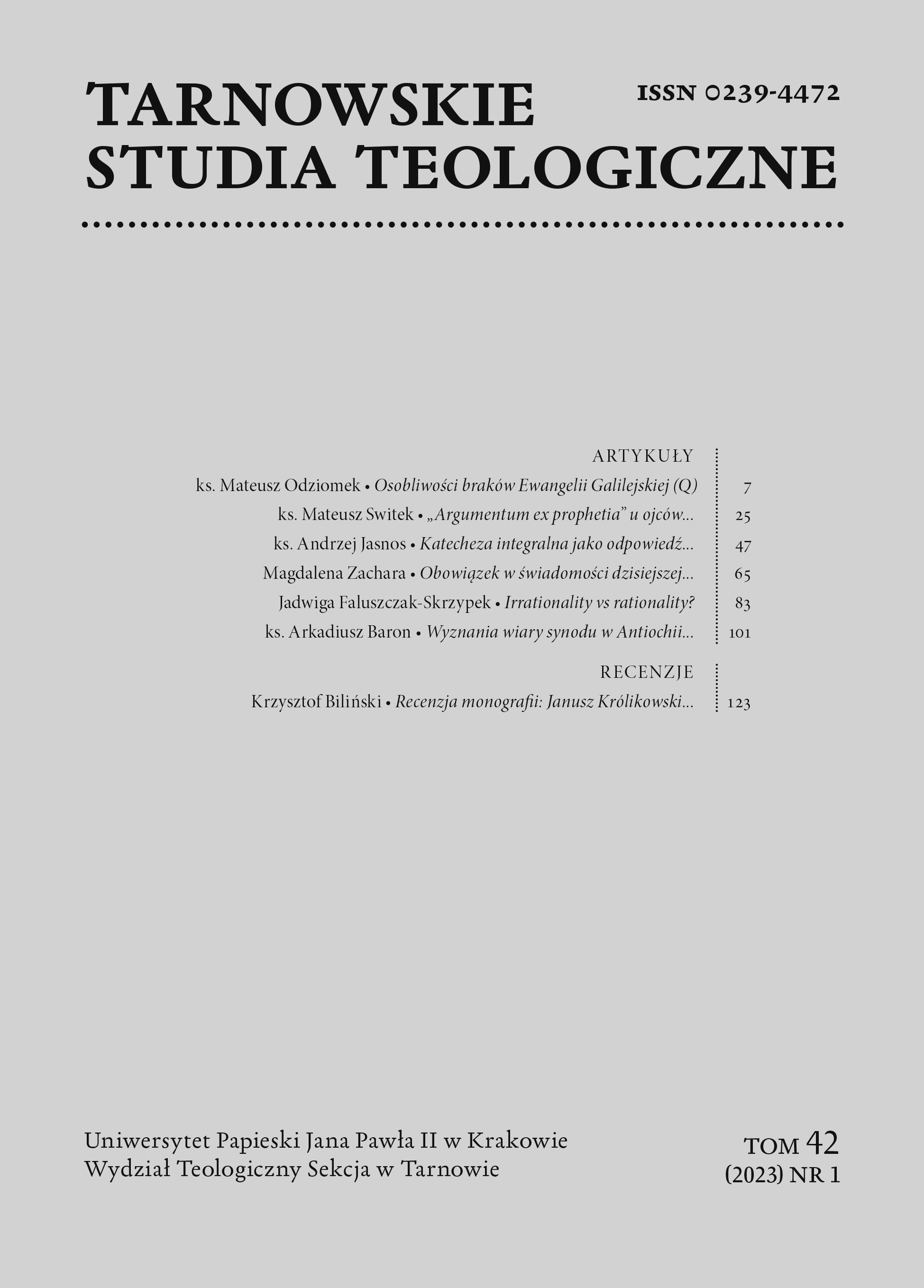Irrationality vs rationality? Irrationality as a door to the rational Greek thought
DOI:
https://doi.org/10.15633/tst.42105Słowa kluczowe:
wczesna grecka filozofia, filozofia religii, kult dionizyjski, irracjonalność, zoeAbstrakt
Początki zachodniej myśli zwykle umieszcza się w filozofii greckiej, gdzie ogólna historia racjonalnego dociekania opartego na logosie ulegała degradacji z mitycznych opowieści przedstawiających nadprzyrodzone przyczyny do zjawisk obserwowalnych. Niniejszy artykuł ma na celu zbadanie przecięcia racjonalnych i irracjonalnych czynników przyczyniających się do powstania filozofii. Autor przechodzi poprzez analizę myśli jońskiej, pitagorejskiej i orfickiej, które zostały ukształtowane przez najbardziej wpływowe dzieła greckich filozofów, takich jak Platon. Teoretyczną podstawę badania stanowiły pisma Rudolfa Otto i Francisa M. Cornforda. W rezultacie wnioski przedstawiają irracjonalność jako korzeń racjonalnej interpretacji rzeczywistości, poprzez wspólne dążenie obu, mające na celu podniesienie postaci ludzkiej, jej niezależność od chaotycznych działań bogów oraz ujawnienie wyższych prawd za pomocą ucieleśnionych środków działania rytualnego, jak również poprzez proces myślenia układania i syntetyzowania. Przykłady przytaczane przez autora eksponują splecenie wiary religijnej i myśli filozoficznej.
Bibliografia
Burnet J., Early Greek philosophy, London 1920.
Chantraine P., Dictionaire étymologique de la langue grecque. Histoire des mots, vol. 2, Paris 1986.
Cohn L., Philonis Alexandrini opera quae supersunt, vol. 1, Berlin 1896.
Cornford F. M., From religion to philosophy. A Study In the Origins of Western Speculation, New York 2004.
De Sassure F., Cours de linguistique générale, Paris 1968.
Eliade M., Rites and Symbols of Initiation. The Mysteries of Birth and Rebirth, trans. W. R. Trask, Harper & Rowe, 1975.
Fournier H., Les verbes “dire” en Grec ancien, Paris 1946.
Gellhorn E., Kiely W., Mystical states of consiousness. Neurophysiological and clinical aspects, “Journal of Nervous and Mental Disease” 154 (1972) issue 6, p. 399–405.
Gilson E., L’être et l’essence, Vrin, 1994.
Główne problemy filozofii starożytnej, przeł. P. Domański, Warszawa 1996.
Godin A., Psychologie des experiences, Paris 1983.
Heidel W. A., Пέρας and ἂπειρον in the Pythagorean Philosophy, „Achiv für Geschichte der Philosophie” 14 (1901), p. 384–399.
Hood R. W., Psychological strength and the report of intense religious experience, “Journal for the Scientific Study of Religion” 13 (1974), p. 65–71.
Kerényi K., Dionysos. Archetypal Image of Indestructible Life, Princeton University Press, 1996.
Kirk G. S., Raven J. E., The Presocratic philosophers. A critical history with a selection of texts, Cambridge University Press, 1971.
Kowalski A., Troska o duszę w “Quis Dives Salvetur” Klemensa Aleksandryjskiego, in: Disputationes quodlibetales, Prešov 2011, p. 38–56.
Kubok D., Prawda i mniemania. Studium filozofii Parmenidesa z Elei, Katowice 2004.
Lewis Ch. T., Short Ch., A Latin Dictionary, Oxford 1879.
Narecki K., Logos we wczesnej myśli greckiej, Lublin 1999.
Otto R., The Idea of Holy. An Inquiry into the Non-rational Factor in the Idea of the Divine and Its Relation to the Rational, trans. J. W. Harvey, Oxford University Press, 1968.
Ross W. D., Aristotle’s “Metaphysics”. A revised text with introduction and commentary, Oxford 1924.
Stróżewski W., Istnienie i sens, Kraków 2005.
Szmyd J., Myślenie i zachowanie nieracjonalne. Tradycyjne i współczesne wymiary. Z psychologii i filozofii irracjonalizmu, Katowice 1996.
Trigg R., Reason and commitment, Cambridge University Press, 1973.
Pobrania
Opublikowane
Numer
Dział
Licencja
Prawa autorskie (c) 2023 Jadwiga Faluszczak-Skrzypek

Utwór dostępny jest na licencji Creative Commons Uznanie autorstwa 4.0 Międzynarodowe.
Autorzy publikujący w czasopiśmie udzielają jego wydawcy zgody o następującej treści:
- Autor zachowuje autorskie prawa majątkowe do utworu, a jednocześnie udziela wydawcy czasopisma zgody na jego pierwszą publikację w wersji drukowanej i wersji online na licencji Creative Commons Uznanie autorstwa 4.0 Międzynarodowe oraz zgody na wykonywanie opracowań, w tym przekładów.
- Autor ma możliwość udzielania zgody niewyłącznej na opublikowanie utworu w wersji, która ukazała się w czasopiśmie (np. zamieszczenia go w repozytorium instytucjonalnym lub opublikowania w książce), wraz z informacją o jego pierwszej publikacji w czasopiśmie.
- Autor może umieścić swój utwór online (np. w repozytorium instytucjonalnym lub na swojej stronie internetowej) jeszcze przed zgłoszeniem utworu do czasopisma.

